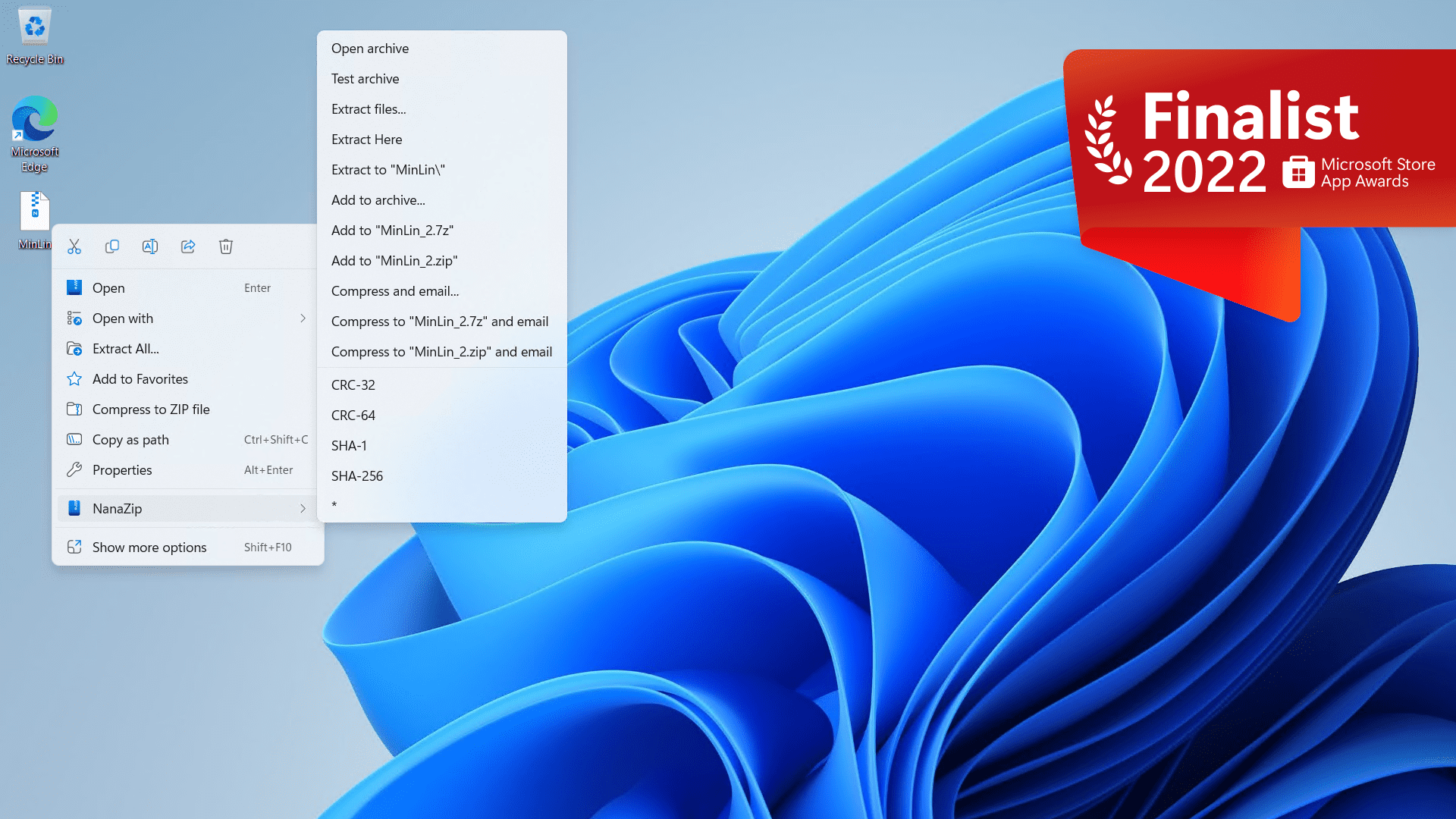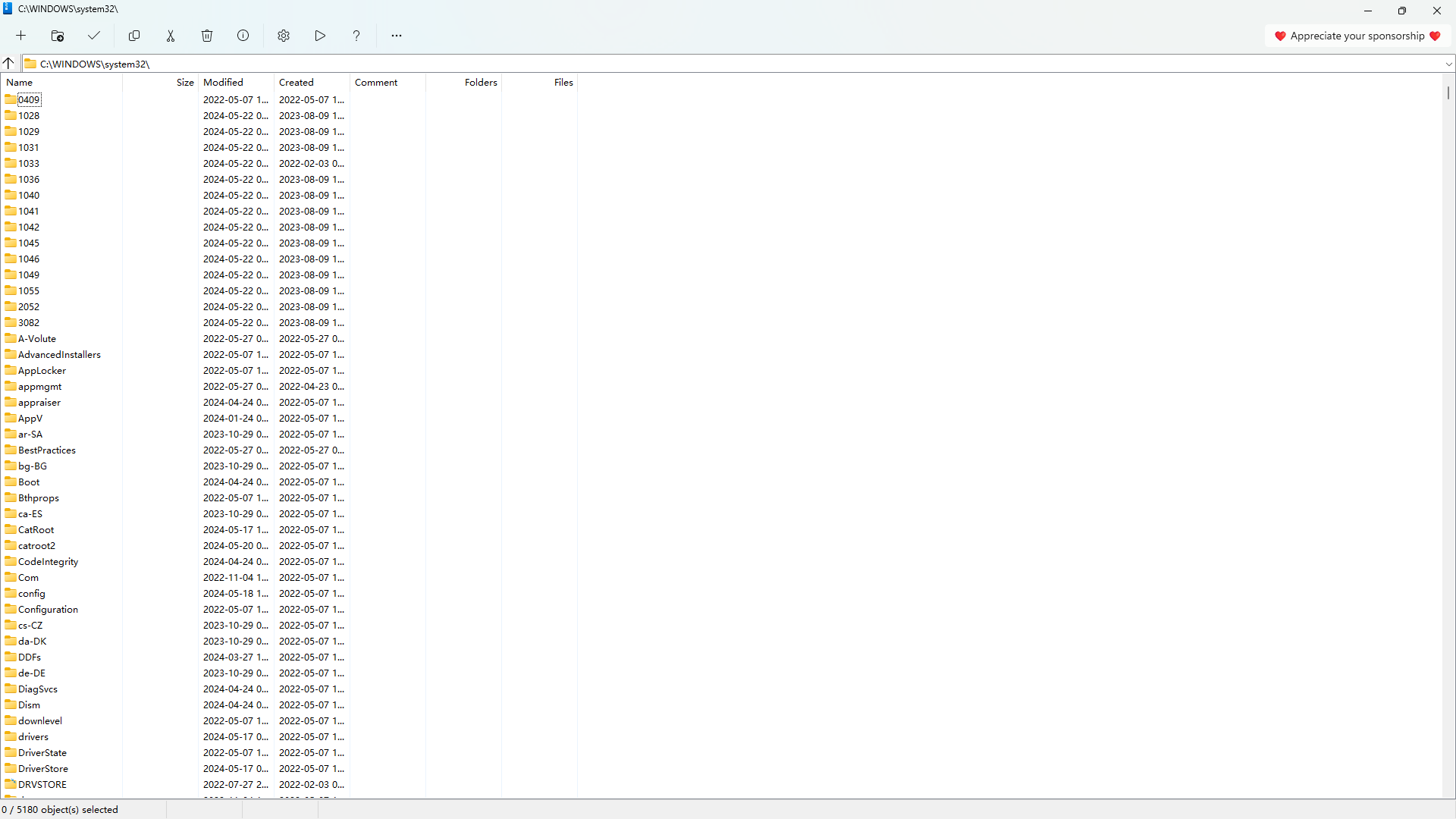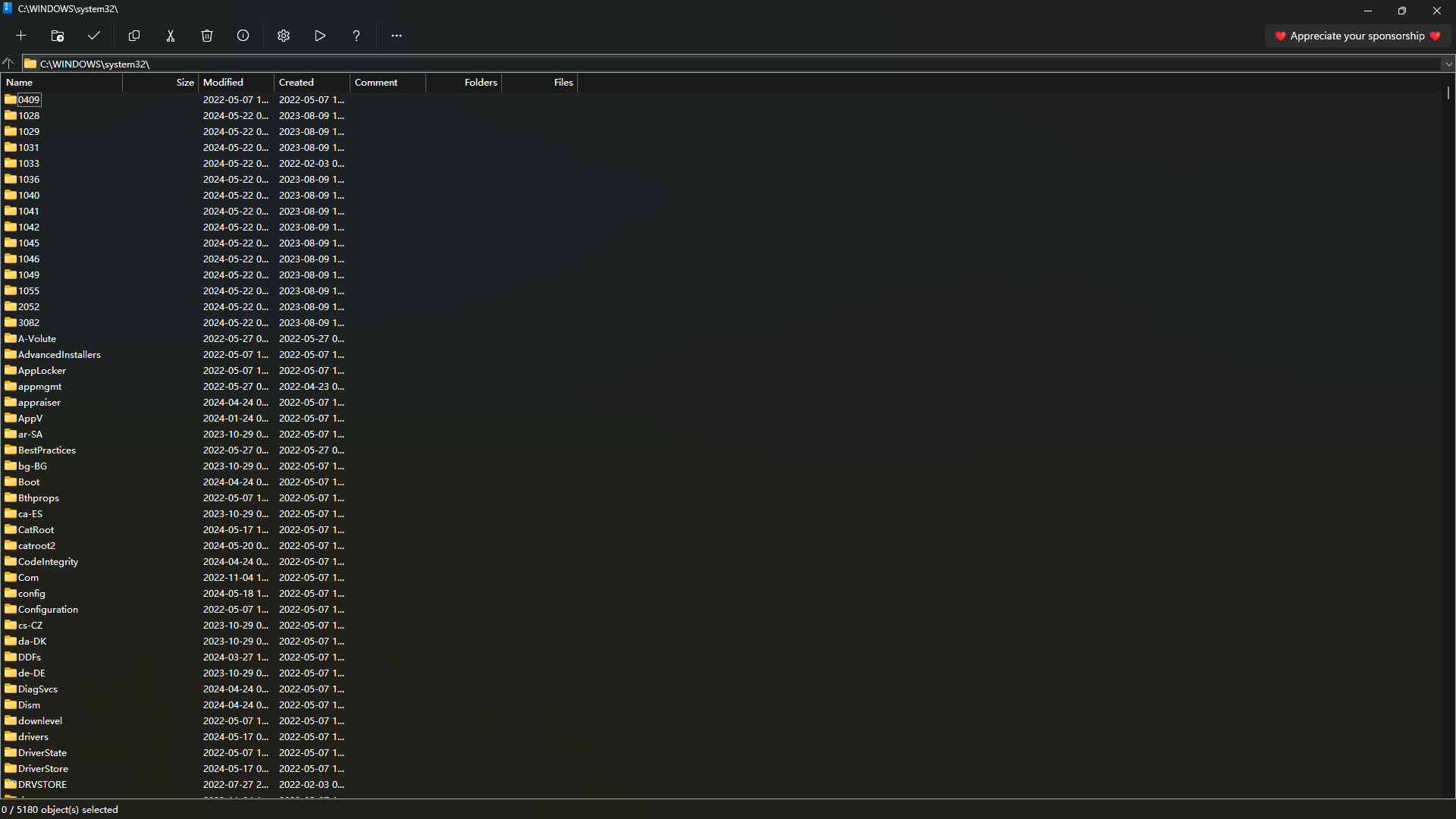NanaZip is an open source file archiver intended for the modern Windows experience, forked from the source code of well-known open source file archiver 7-Zip.
All kinds of contributions will be appreciated. All suggestions, pull requests and issues are welcome.
If you want to sponsor me, please read this document to become a sponsor.
If you'd like me to add features or improvements ahead of time, please use paid services.
Kenji Mouri
- Inherit all features from 7-Zip 24.05.
- Support the dark mode for all GUI components.
- Support the Mica effect to the main window. You will enjoy the full window immersive Mica for all GUI components if you are using dark mode with HDR disabled.
- Packaging with MSIX for modern deployment experience.
- Support the context menu in Windows 10/11 File Explorer.
- Enable NSIS script decompiling support for the NSIS archives. (Merged from 7-Zip NSIS branch.)
- Provide 7-Zip execution alias for helping users to migrate to NanaZip.
- Support the Brotli, Fast-LZMA2, Lizard, LZ4, LZ5 and Zstandard codecs. (Merged from 7-Zip ZS branch.)
- Support the Per-Monitor DPI-Aware for all GUI components.
- Support the i18n for GUI edition of Self Extracting Executable.
- Integrate the following HASH algorithms to NanaZip from RHash (AICH, BLAKE2b, BTIH, ED2K, EDON-R 224, EDON-R 256, EDON-R 384, EDON-R 512, GOST R 34.11-94, GOST R 34.11-94 CryptoPro, GOST R 34.11-2012 256, GOST R 34.11-2012 512, HAS-160, RIPEMD-160, SHA-224, SHA3-224, SHA3-256, SHA3-384, SHA3-512, Snefru-128, Snefru-256, Tiger, Tiger2, TTH, Whirlpool), xxHash (XXH3_64bits, XXH3_128bits) and GmSSL (SM3).
- Enable Control Flow Guard (CFG) to all target binaries for mitigating ROP attacks.
- Mark all x86 and x64 target binaries as compatible with Control-flow Enforcement Technology (CET) Shadow Stack.
- Strict handle checks at runtime to block the use of invalid handles.
- Disable dynamic code generation in Release builds prevents generating malicious code at runtime.
- Block loading unexpected libraries from remote sources at runtime.
- Enable Package Integrity Check.
- Enable EH Continuation Metadata.
- Enable Signed Returns.
- Enable disabling child process creation for command line version of NanaZip.
NanaZip 3.0 and onwards will have two distribution flavors called NanaZip and NanaZip Classic. Here are the differences between them.
-
NanaZip
- Only 64-Bit support.
- Only MSIX packaged version.
- Support the context menu in Windows 10/11 File Explorer.
- Only support Windows 10 Version 2004 (Build 19041) or later.
- Have XAML-based GUI and VT-based CLI.
-
NanaZip Classic
- Have 32-Bit support.
- Only portable version.
- Don't have the context menu support.
- Support Windows Vista RTM (Build 6000.16386) or later.
- Keep Win32 GUI and Win32 CLI.
-
NanaZip (XAML-based GUI, VT-based CLI and MSIX package)
- Supported OS: Windows 10 Version 2004 (Build 19041) or later
- Supported Platforms: x86 (64-bit) and ARM (64-bit)
-
NanaZip Classic (Win32 GUI and Win32 CLI)
- Supported OS: Windows Vista RTM (Build 6000.16386) or later
- Supported Platforms: x86 (32-bit and 64-bit) and ARM (64-bit)
-
NanaZip Core (Core Library and the Self Extracting Executables)
- Supported OS: Windows Vista RTM (Build 6000.16386) or later
- Supported Platforms: x86 (32-bit and 64-bit) and ARM (64-bit)
We only choose Windows as the major platform for the NanaZip project supported because Windows has maintained a good and proven ABI and compatibility, and stands out in the whole history. But we also care about the non-Windows platform. Here are the policy for non-Windows platform support:
- The modern flavor of NanaZip won't support non-Windows unless someguys ported WinRT XAML to POSIX. So, non-Windows support policy is only for NanaZip Core and NanaZip Classic.
- The developer team will try best to support Wine which has the Windows Vista or later feature level. Currenly tested simply under Wine 9.x.
- We don't support the ReactOS and its derivatives because they are too hard to support. But testing under the ReactOS and its derivatives may be interesting.
Here are some available installation methods for NanaZip.
This is the recommended way to install NanaZip.
Search and install NanaZip in Windows Store for stable release, and NanaZip Preview for preview release.
Also, you can also click the Microsoft Store link you needed.
You also can download the MSIX Package in GitHub Releases.
After you have downloaded the MSIX Package, you can double click to install it, or you can execute the following command in the PowerShell which is run as administrator.
PowerShell -NoLogo -NoProfile -NonInteractive -InputFormat None -ExecutionPolicy Bypass Add-AppxPackage -DeferRegistrationWhenPackagesAreInUse -ForceUpdateFromAnyVersion -Path
The path of the MSIX package
P.S. All needed dependencies are included in the MSIX Package of NanaZip because we known that it's very difficult for users who do not have access to the store to get our dependency packages, and we want to be robust and deployable everywhere.
If you want to install NanaZip for all users, you can execute the following command in the PowerShell which is run as administrator.
PowerShell -NoLogo -NoProfile -NonInteractive -InputFormat None -ExecutionPolicy Bypass Add-AppxProvisionedPackage -Online -PackagePath
The path of the MSIX package-SkipLicense
You also can execute the following command in the Command Prompt which is run as administrator instead.
DISM.exe /Online /Add-ProvisionedAppxPackage /PackagePath:
The path of the MSIX package/SkipLicense
For more information, please read documents for PowerShell and DISM
P.S. Due to the policy from Microsoft Store, you need to run NanaZip with the internet connection at the first time for getting the license if you install NanaZip without the internet connection, otherwise Windows won't launch NanaZip properly.
If you want to uninstall NanaZip you installed for all users, you can execute the following command in the PowerShell which is run as administrator.
Get-AppxPackage -Name 40174MouriNaruto.NanaZip -AllUsers | Remove-AppxPackage -AllUsers -Confirm
- If you can't find NanaZip in the context menu, please restart all File Explorer processes via Task Manager.
- Due to the design of MSIX, drives' context menu in Explorer only show in Windows 11(22H2)+.
- Due to the issues in Desktop Bridge file system virtualization, you are unable to use NanaZip in the Safe Mode of Windows.
- Due to the policy from Microsoft Store, NanaZip is unable to disable Desktop
Bridge file system virtualization, so the file operations in
%UserProfile%/AppDatawill be redirected in Windows 10, and file operations in directories other thanLocal,LocalLowandRoamingin%UserProfile%/AppDatawill still be redirected in Windows 11. - Due to the Microsoft Store limitations, NanaZip 1.2 and later won't support languages not mentioned in https://docs.microsoft.com/en-us/windows/uwp/publish/supported-languages.
- If you turn off the Windows Firewall, you may fail to install NanaZip. (M2Team#204) (microsoft/terminal#12269)
- Due to the System Settings APP limitations, only starting with Windows 11+ (Build 22000.1817+ & 22621.1555+), you can launch directly to the settings page of file association for NanaZip. (https://learn.microsoft.com/en-us/windows/uwp/launch-resume/launch-default-apps-settings)
- Blue Moon (3.x) Series (Before 2024 Q3)
- Continue to modernize the UI with XAML Islands with the Windows 11 control style, dark and light mode support.
- Full Accessibility support in all UI components.
- Migrate configurations from registry to json. (Suggested by AndromedaMelody.)
- Continue to modernize the core implementation.
- Try to Windows Runtime component for interoperability.
- Provide NanaZip Installer for simplify the deployment.
- Try to add option for save file names with UTF-8 in 7z archives.
- Add batch task support. (Suggested by 刘泪.)
- Try to design the new UI layout. (Suggested by wangwenx190.)
- Try to add option for using Windows Imaging API (WIMGAPI) backend to make better creation and extraction support for wim archives, also add creation and extraction support for esd archives.
- Try to add pri archive extracting support.
- Try to add smart extraction.
- Try to add language encoding switching support for file names in File Manager. (Suggested by 刘泪 and zjkmxy.)
- Try to add deleting source after archiving support. (Suggested by OrionGrant.)
- Try to add an option when extracting an archive to open the folder where you extracted the files, like WinRAR. (Suggested by maicol07.)
- Try to add ISO creation support.
- Sherlock Holmes (5.x) Series (Before 2025 Q3)
- Currently no new feature plans for this series.
- Unpredictable Future Series (T.B.D.)
- Try to create a new archive file format optimized for software
distribution and image backup and restore.
- Keeping metadata provided by file system.
- File referencing support.
- Integrity verification support.
- Differential support.
- Recovery record support.
- Provide lightweight SDK for authoring and consuming.
- Try to contribute recovery record support for 7z archives to 7-Zip mainline. (Suggested by SakuraNeko.)
- Try to port NanaZip to Linux.
- Try to port MegaUI (an developing lightweight UI framework created by mingkuang, under internal developing at the current stage, will be open source if the work has done) framework to Linux.
- Try to create MinLin (a.k.a. Minimum Linux, a distro intended for helping publish distroless binaries and provide some Windows API functions as static libraries for having a lightweight platform abstraction layer) project because I think NanaZip should support distroless environment for reducing time wasting for compiling for different distros.
- After porting NanaZip to Linux, accept contributions from community folks for other POSIX platforms (e.g. FreeBSD) and macOS support.
- Try to add extension for Windows File Explorer for give user immersive experience like builtin zip file support in Windows. (Suggested by SakuraNeko and shuax.)
- Try to create isolated and portable plugin infrastructure based on 64-bit RISC-V Unprivileged ISA Specification. Runtime Project: https://github.com/ChaosAIOfficial/RaySoul
- Try to create a new archive file format optimized for software
distribution and image backup and restore.












